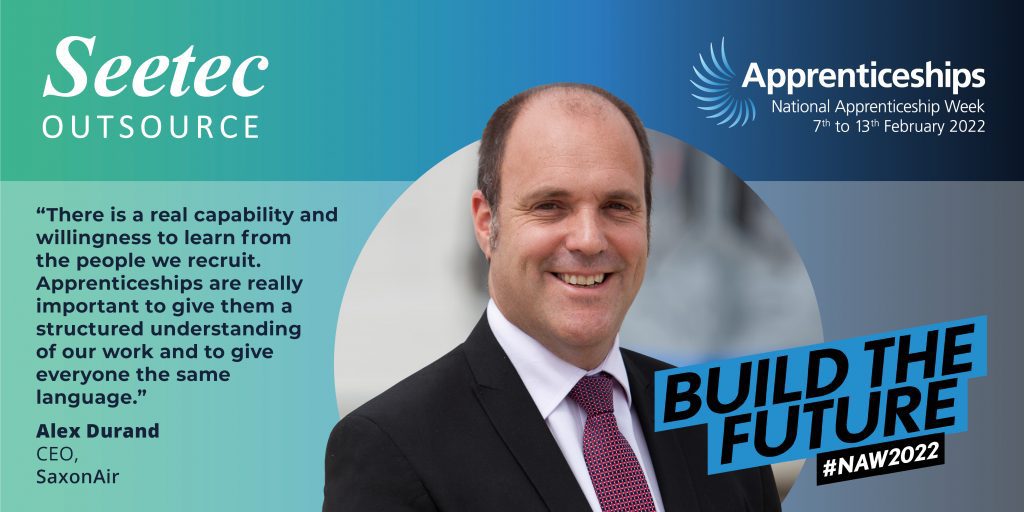
During National Apprenticeship Week, which runs from 7th to 13th February, the CEO of private air travel business SaxonAir reflects on how apprenticeships should be at the heart of gaining professional recognition for the growth of the aviation industry.
SaxonAir is one of many charter flight operators which were hit hard by the Covid-19 pandemic. But the Norwich-based business, launched in 2007, has seized the opportunity to focus on the workforce skills needed to succeed and grow.
Alex Durand, SaxonAir’s CEO, explained: “During the pandemic, we lost 95% of our income and it has been very difficult, but the flipside is that we’ve created changes and improved the profile of charter airlines.
“Since the lockdown eased, we’ve seen a big uplift in demand as an alternative to commercial airlines.”
During the pandemic, SaxonAir started working with skills specialist Seetec Outsource, who deliver a wide range of apprenticeships within the aviation industry.
“Seetec were willing to adapt the existing apprenticeship standard to meet the needs of our business, which are different to those of commercial airlines,” Alex said.
“They have a real energy to make it work, to reshape the standard whilst keeping its integrity.”
Alex, a former pilot who became SaxonAir CEO nine years ago, explained the company was an early adopter of the apprenticeships, recognising the opportunities they provide.
He said: “There’s a real scarcity of appropriate aviation apprenticeships on the operational side. The sector is a major employer, it supports more jobs than aerospace. We have a world-leading sector with a growing number of businesses, yet there is a real lack of recognised, rigorous professional training.
“There is a significant difference between aviation in the USA and Europe. The USA has a dispatchers’ licence which is a more robust qualification, covering some of the theory that pilots learn and aspects like loading the aircraft. We need a proper, structured aviation pathway in the UK.”
Alex believes the government is starting to recognise the contribution the aviation industry makes to the economy and global connectivity. “We are now trying to get these apprenticeships as fit for purpose as they can be for our sector. We want them to be shaped and moulded to the work we do.
“There is a real capability and willingness to learn from the people we recruit. Apprenticeships are really important to give them a structured understanding of our work and to give everyone the same language.
“Apprenticeships are not just for school leavers. We have asked our experienced people to undertake them too, offering everyone the opportunity to upskill.
“Our experienced people will then have recognised qualifications, which reflect what they have learned and applied. We work in a challenging environment with highly skilled, highly motivated, professional people, and I think it does everyone a disservice if they don’t have the professional accreditation to reflect that.”
Natalie Mayes has been with SaxonAir for five years and was recently promoted to Head of Ground Operations. She is currently undertaking the level 4 aviation operations manager apprenticeship and has welcomed the opportunity to develop within her new role. She explained,
“Having changed career to work in the aviation industry, I’ve gained a lot of experience but had no qualifications to back this up. My degree was in a completely unrelated field.
“The apprenticeship is a fantastic way to gain an industry-recognised qualification. It’s directly linked to my day-to-day role, so I’m able to put what I’ve learned into practice. My goal is to run a safe, efficient and financially sound operations department, and the apprenticeship is definitely helping with this.
“SaxonAir have been incredibly supportive and given me a great deal of flexibility to manage the apprenticeship learning around my work schedule. It’s a really exciting way to grow and develop within my new role.”
Alex is passionate about helping to raise employment aspirations in Norfolk. “We want to create an Aviation Academy at Norwich. In some parts of the region, it’s hard for school leavers to feel there’s a route for them. We offer an interesting environment that they wouldn’t necessarily be aware of, which is literally on their doorstep. The apprenticeship structure will help to increase visibility.”
“We want to see people at Level 3 progressing to Level 4, applying their knowledge to the business environment, rather than undertaking generic management training.
“We have done the hard work to get our apprenticeship programme up and running and adapted to our needs. We see it as the way to grow and get the right skills in the business.”



